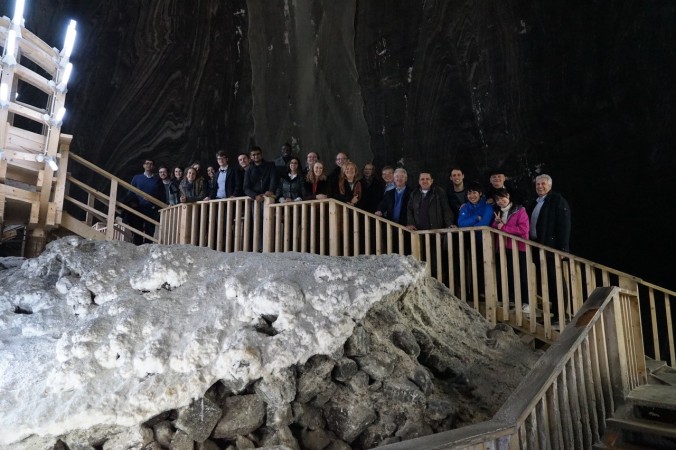One of the pillars of the Marie Skłodowska-Curie actions is to provide Europe’s next experts in various fields. Aside from his or her PhD project, an Early Stage Researcher is also granted the opportunity to partake in multiple summer schools and workshops, providing the additional training and knowledge needed to become a true professional.
The first workshop of the CORE Innovative Training Network (ITN) took place in Cluj-Napoca in Romania. Cluj is the capital of the Transylvania region and to some notorious for its haunted forest and bloodthirsty vampires. Creepy stories aside, we surely enjoyed the winter atmosphere, the delicious food, the traditional drinks and the warm hospitality of the people around the city. Whereas our previous meeting was an open event, this workshop was restricted to CORE members. This gave us the opportunity to get to know each other even better, turning this ‘network’ more and more into a ‘family’.
 The venue of the workshop was TeraCrystal, an industrial partner of the CORE ITN that is specialized in research and characterization of solid-state pharmaceuticals. Mihaela, our host at TeraCrystal, showed us the various aspects of the workflow within her company and kindly gave us a tour of laboratories. Rather quickly it became clear that the facilities, instruments and work pace were very different from the working conditions of an Early Stage Researcher. For instance, the duration and extensiveness of the studies performed on an industrial level are much smaller than those in an academic setting. This reduction in time scale is a direct and logical consequence of the industry’s objectives: provide the customer with clear and fast solutions while ensuring a sufficient amount of profit is made to sustain a healthy company. Where some of these (industry) objectives do play a role in an ITN, they do not play a central role in a regular PhD project.
The venue of the workshop was TeraCrystal, an industrial partner of the CORE ITN that is specialized in research and characterization of solid-state pharmaceuticals. Mihaela, our host at TeraCrystal, showed us the various aspects of the workflow within her company and kindly gave us a tour of laboratories. Rather quickly it became clear that the facilities, instruments and work pace were very different from the working conditions of an Early Stage Researcher. For instance, the duration and extensiveness of the studies performed on an industrial level are much smaller than those in an academic setting. This reduction in time scale is a direct and logical consequence of the industry’s objectives: provide the customer with clear and fast solutions while ensuring a sufficient amount of profit is made to sustain a healthy company. Where some of these (industry) objectives do play a role in an ITN, they do not play a central role in a regular PhD project.
Nevertheless, TeraCrystal was the perfect setting for one of the aims of our meeting: the involvement of industrial partners in the discussion about the project’s ‘model compounds’ (i.e. a series of chemicals that will be the subject of our further research). Their proposals and following debates were consequently from an industrial perspective. It was interesting to be part of discussions concerning topics such as productivity, efficiency, time restrictions, viability of a plan and other challenges, which are all key to industry and quite distant from our daily decision schemes. Since it is important to take these aspects in consideration when researching the network’s model compounds, we believe this will be a welcome learning experience for our academic research career.
Collaboration is one of the central features in our ITN: it creates opportunities for the Early Stage Researcher that are usually precluded to students and researchers at the same stage. We have the chance to travel a lot, discovering new places all over Europe during workshops, summer schools and internships (secondments). The latter gives us the chance to leave our comfort zone and work in a different environment, either in academia and industry, allowing us to build up our personal network and acquire more skills to become the true experts of tomorrow. Not only the work itself, but also blending in with the locals and being part of a different culture during these internships grants us the possibility to grow as a person.

In this concern, being able to spend a part of our PhD research within a company is very relevant: taking part in an industrial working environment prior to finishing our PhD and looking for a future job is a priceless benefit. Nevertheless, we realize that for our colleagues, friends and relatives this opportunity is not common at all. Therefore, we feel that we are very fortunate to be able to get a glimpse of what is going on in industry and have an idea of the environment, commonly encountered problems and challenges that come with such a lifestyle.
Jan Devogelaer and Carola Tortora
Jan and Carola are two of the 15 Early Stage Researchers in the CORE Network.
| Jan-Joris Devogelaer Department of Solid State Chemistry Radboud University of Nijmegen j.devogelaer@science.ru.nlJan is a PhD Researcher at Radboud University. His research interests predominantly lie in datamining, molecular modeling and chemoinformatics of chiral conglomerate systems. His goal is to develop a tool capable of investigating the behavior and finding rules behind conglomerate formation of complex multicomponent chiral systems (salts, solvates, cocrystals) based on Cambridge Structural Database entries. Therefore, he also plans to further specialize in crystallography of chiral systems and the principles behind enabling chiral resolution processes.Visit Jan’s profile
|
Carola Tortora Department of Chemistry and Pharmacy Friedrich Alexander Universität (FAU) carola.tortora@fau.deCarola is a PhD Researcher at Friedrich Alexander Universität (FAU) in Erlangen, under the supervision of Prof. Svetlana Tsogoeva, studying racemization methods for continuous resolution. Her research interest is organic synthesis, in particular organocatalysis, asymmetric synthesis and racemization methods.Visit Carola’s profile
|